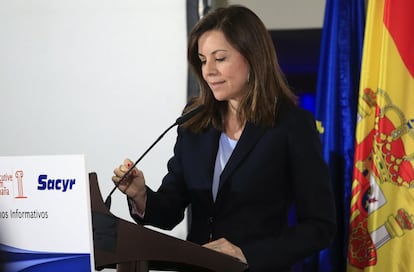Panama says it will cooperate with Spain on offshore probes
Ambassador in Madrid says country is being unfairly judged over leak of offshore deals


Panama’s ambassador to Spain said on Tuesday that her government will fully cooperate with Spanish authorities investigating cases related to the so-called “Panama Papers” leak.
A day after news organizations revealed a huge trove of insider information from Panama-based law firm Mossack Fonseca, which specializes in creating offshore businesses for international clients, María Mercedes de la Guardia Corró sought to dispel claims that Panama is too permissive with regard to financial wrongdoing and that it functions as a tax haven.
I’d rather call the Panama Papers the Mossack Fonseca papers. The case affects one firm, but it also affects the image of Panama Panama’s ambassador to Spain
“We feel affected,” said the ambassador at a power breakfast sponsored by Sacyr, the Spanish construction group that is currently in charge of a project to widen the Panama Canal.
“Regarding the Panama papers, I’d rather call them the Mossack Fonseca papers,” she said. “The case affects one firm, but it also affects the image of Panama.”
De la Guardia Corró said the government of Panama will help the Spanish Tax Agency and judiciary determine whether Spanish nationals mentioned in the leaked files incurred in any illegal activities, including money laundering or tax evasion, and whether their offshore assets were legal.
The 11.5 million files leaked to the media make mention of Barça star Leo Messi, filmmaker brothers Pedro and Agustín Almodóvar, and an aunt of Spain’s King Felipe, among others.
“The president has said that Panama will cooperate actively with the investigation,” said the ambassador. “The Panamanian government is committed to zero tolerance regarding corruption. Panama is going to be cooperative, especially with Spain, with whom we have an information-exchange agreement since 2011.”
The Panamanian government is committed to zero tolerance regarding corruption
But the ambassador also defended her country’s refusal to sign a multilateral agreement for automatic information exchange that 80 other nations have already adopted. De la Guardia Corró said this agreement would violate her country’s constitution and could violate citizen rights.
“Confidentiality is not just sought by criminals,” she said. “It is also legitimate for those wishing to remain anonymous without committing unlawful acts.”
English version by Susana Urra.
Tu suscripción se está usando en otro dispositivo
¿Quieres añadir otro usuario a tu suscripción?
Si continúas leyendo en este dispositivo, no se podrá leer en el otro.
FlechaTu suscripción se está usando en otro dispositivo y solo puedes acceder a EL PAÍS desde un dispositivo a la vez.
Si quieres compartir tu cuenta, cambia tu suscripción a la modalidad Premium, así podrás añadir otro usuario. Cada uno accederá con su propia cuenta de email, lo que os permitirá personalizar vuestra experiencia en EL PAÍS.
¿Tienes una suscripción de empresa? Accede aquí para contratar más cuentas.
En el caso de no saber quién está usando tu cuenta, te recomendamos cambiar tu contraseña aquí.
Si decides continuar compartiendo tu cuenta, este mensaje se mostrará en tu dispositivo y en el de la otra persona que está usando tu cuenta de forma indefinida, afectando a tu experiencia de lectura. Puedes consultar aquí los términos y condiciones de la suscripción digital.








































